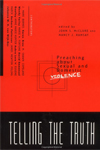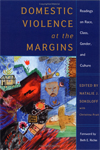ANTI-DOMESTIC VIOLENCE DAY
LECTIONARY COMMENTARY
Sunday, June 24, 2012
Veronica M. Johnson, Guest Lectionary Commentator
Pastoral Staff, Covenant United Church of Christ, South Holland, IL
- Prior to the day on which your church celebrates Anti-Domestic Violence Day, offer lectures and workshops about domestic violence and ways to end it. Invite local and national speakers and persons who are trained to aid domestic violence victims. Advertise the event well on social media. Be sure to involve youth and teens and partner with sister churches and state and federal organizations. Have resources available for those who need immediate help.
Lection – Psalm 11:4-7 (New Revised Standard Version)
(v. 4) The Lord is in his holy temple; the Lord’s throne is in heaven.
His eyes behold, his gaze examines humankind.
(v. 5) The Lord tests the righteous and the wicked,
and his soul hates the lover of violence.
(v. 6) On the wicked he will rain coals of fire and sulphur;
a scorching wind shall be the portion of their cup.
(v. 7) For the Lord is righteous; he loves righteous deeds;
the upright shall behold his face.
I. Description of the Liturgical Moment
Anti-Domestic Violence Day continues the tradition of the Domestic Violence Sabbath Observance established by The Black Church and Domestic Violence Institute in October 2000.1 Instead of continuing a tradition of silence, Anti-Domestic Violence Day affords churches the opportunity to continue (or in many cases begin) a tradition of saying unequivocally that God’s “soul hates the lover of violence” (v. 5).
In observance of Anti-Domestic Violence Day faith communities offer God’s healing to the minds, bodies, and souls of all who have been affected by domestic violence. Through worship services, candlelight vigils, workshops, and distribution of resources, the faith community speaks up and speaks out to say “No” to those who would commit violence against a “loved one” or “friend”; “We Support You” to those who have been abused; “We Mourn With You” to those who have suffered loss; and “God Can Heal You” to the victims, to the abusers, and to their families. The services and resources offer information on the prevalence and ripple effect of domestic violence, as well as appropriate ways to address the issue and advocate for all persons impacted by domestic violence.
II. Biblical Interpretation for Preaching and Worship: Psalm 11:4-7
Part One: The Contemporary Contexts of the Interpreter
During an Old Testament course in seminary, our class engaged in a spirited discussion on the prevalence of violence against women and on what appears to be divinely sanctioned violence in the Bible. While some in the class supported the concept of divinely sanctioned violence, others, including myself, expressed an opposing view that violence only begets more violence. I shared my opinion that the blatant oppression and violence experienced by black men in America during slavery and post-slavery cultivated a host of angry men, some of whom took their rage out on the women in their lives.
Unfortunately, my mother was one of those women. The horrible memories of her abuse during my childhood left an indelible impression on me; in essence, I too was abused. After sharing this, five women confided in me that their mothers had also been abused. The professor shared that both his biological and adoptive mothers suffered domestic abuse. Eight mothers (out of twenty-seven participants in this seminary class) were victims of domestic abuse! Our class nearly reflected current statistics on domestic abuse. According to DomesticViolenceStatistics.org, at least one third of women world-wide have been victims of domestic abuse.2
The opinion shared in my seminary class that “violence begets more violence” is reminiscent of the quotation from Rev. Dr. Martin L. King, Jr.: “Darkness cannot drive out darkness; only light can do that. Hate cannot drive out hate; only love can do that. Hate multiplies hate, violence multiplies violence, and toughness multiplies toughness in a descending spiral of destruction. . . . The chain reaction of evil—hate begetting hate, wars producing more wars—must be broken, or we shall be plunged into the dark abyss of annihilation.”3
Who has not heard stories in the black church about the deacon or preacher who beats his wife? The offenders are among us, and are even leaders in our churches. The challenge for the Church is to offer help (especially professional help) to those in our churches who are suffering from abuse. Then we need to establish “zero tolerance” policies toward domestic abuse, especially by church leaders.
Part Two: Biblical Commentary
The historical setting of Psalm 11:4-7 is found in the first three verses of the psalm. The psalmist, being pursued by an enemy and in need of protection, has been advised to “flee” (v. 1b) because according to the advisor, the righteous cannot prevail against the wicked (vv. 2-3). Psalm 11 is the psalmist’s response to his advisor. It expresses his faith and the reasons for his faith in God.
First, the psalmist responds directly to his advisor’s suggestion to “flee to the mountains”: the psalmist finds refuge with the Lord (v. 1). In verse 4 he locates the Lord “in his holy temple.” It is as if he is saying, “Why flee to the mountains when ‘the Lord is in his holy temple’?” This verse speaks of the faith of Israel, the faith of the psalmist, and the faith of many today, that God is among us on earth, in the temple, and that “where the Spirit of the Lord is, there is liberty” (2 Corinthians 3:17b).
Next the psalmist locates “the Lord’s throne . . . in heaven” (v. 4b). While the Lord is among us in the temple, the Lord’s throne, i.e., the place from which God rules and judges, according to the psalmist, is in heaven. Locating the place of judgment in heaven supports the psalmist’s next point, that the Lord’s “eyes behold . . . humankind” (v. 4c). From heaven, one can surmise, God has a vantage point that allows God to be, as Hagar says in Genesis 16:13, “El Roi,” “the God who sees” [all].
God sees all and in so doing examines humankind (v. 4c). God’s ability to examine means that God sees us in totality (the good, the bad, and the ugly). God not only sees what we do, but God knows why we do what we do. God is omniscient, or as the elders in the black church often say, God is “all-seeing and all-knowing.”
In verse 5 the psalmist continues expressing the ways of God on which his confidence is founded: the Lord “tests the righteous and the wicked,” and through this testing the Lord discerns the heart that “loves violence.” The psalmist makes an emphatic statement of how God feels about violence. It would have been a strong statement to say that God hates violence. But to say God’s “soul hates the lover of violence” does two things. One, it speaks of the depth (“soul”) of God’s feelings about violence, and two, it reveals that God can discern the depth (“love”) of a person’s devotion to violence. Considering the commandment “thou shalt love the Lord thy God . . .” (Deuteronomy 6:5), agape love is the strongest emotion or connection one can have. The psalmist specifies that God deeply hates those who have the deepest connection not with God but violence!
The final verses lay out the consequences from God for the wicked and the righteous. The consequences for the wicked, are, quite bluntly, “fire and brimstone” (v. 6, KJV)! God, whose “soul hates the lover of violence,” violently “rains coals of fire and sulfur” (i.e., brimstone), and this rain is accompanied by “a scorching wind” (v. 6, NRSV).
The psalmist ends his profession of faith by summarizing all of God’s attributes in one word: “righteous” (v. 7a). God’s righteousness is evident for the psalmist through God’s examination and testing of humanity prior to applying punishment! Furthermore, contrasting the Lord’s hatred of “the lover of violence,” the psalmist offers that “the Lord loves righteous deeds” (v. 7b).
Finally, the psalmist reveals the promise for the righteous: “the upright shall behold his face” (v. 7c). The psalmist counts himself among the righteous, and ends his profession of trust and confidence in God with the blessed assurance of one day beholding God’s face.
The Challenge
The psalmist tells us that God examines and tests humankind to discern those who are “lovers of violence” prior to delivering punishment. This implies that not everyone who commits violence is a “lover of violence.” Many who commit domestic abuse are victims of abuse themselves and are carrying out learned behavior. You may have heard the expression “hurt people hurt people.” Shouldn’t the Church offer healing to victims and offenders of domestic abuse, offenders who were likely abused too? Yet this important impulse to help offenders should not cloud our first mandate—to rescue those who are in danger, as we hold perpetrators accountable.
Descriptive Details
The descriptive details of this passage include:
Sounds: (v. 5): the many sounds of associated with violence (screaming, crying, yelling, police sirens, etc.); (v. 6): the fierce sounds of rains of coal and of scorching wind;
Sights: (v. 4): the Lord’s throne in heaven, the Lord’s eyes seeing and the Lord’s “gaze” examining all the actions of humankind; (v. 5): the sight of violence; (v. 6): the rain of coals of fire and sulfur, the damage caused by a scorching wind, the portion of their cup; (v. 7): beholding the face of God; and
Smells: (v. 6): the unbearable fumes from the coals of fire and sulfur; the smell of violence, namely blood.
III. Other Sermonic Information That Preachers and Laypersons Can Use
- Although verse 1 is not part of the text selection, it reveals the psalmist’s context: the psalmist is answering an advisor who told him to “flee like a bird to the mountains.” The psalmist’s answer that he takes “refuge in the Lord” reflects his rejection of the advice to “flee...” In view of the seriousness of domestic violence, we must take great caution in implying that those who are suffering from domestic abuse should also (like the psalmist) reject the advice to “flee.” Fleeing from violence may help prevent serious injury or death for any or all persons involved. While women have often received so-called biblical advice to “submit,” “stay,” or “fight for your marriage,” this is an opportunity to give holy wise advice that aligns with long-standing professional advice with regards to domestic abuse, which is to remove oneself from danger!
- How well has the black church served the role of sanctuary for battered women? Many women still seek refuge in “the temple.” The Church has been a sanctuary, i.e., a safe haven, often unknowingly, for women who are willing to stay at church all day on Sunday, and return to church several times during the week, just to stay away from an abusive partner as long as possible. The Church can serve women in even greater ways by lifting the veil on this issue, and by providing information and services that women need to not only avoid the violence on a daily basis, but to also bring an end to the violence and thereby experience healing for their minds, body, and souls. Every Church at least once each year, if not more often, should offer classes led by professionals who can help women and children escape and overcome domestic violence. The need is great and to do less is irresponsible.
Resources
 |
McClure, John S., and Nancy J. Ramsay, eds. Telling the Truth: Preaching about Sexual and Domestic Violence. Cleveland, OH: United Church Press, 1998.
|
 |
Sokoloff, Natalie J., ed. Domestic Violence at the Margins: Readings on Race, Class, Gender, and Culture. New Brunswick, NJ: Rutgers University Press, 2005. |
Notes
1. For more information, visit The Black Church and Domestic Violence Institute.
2. Domestic Violence Statistics, 2012. Online location: http://www.domesticviolencestatistics.org accessed 27 February 2012.
3. King, Martin Luther, Jr., Strength to Love, 1963.
|